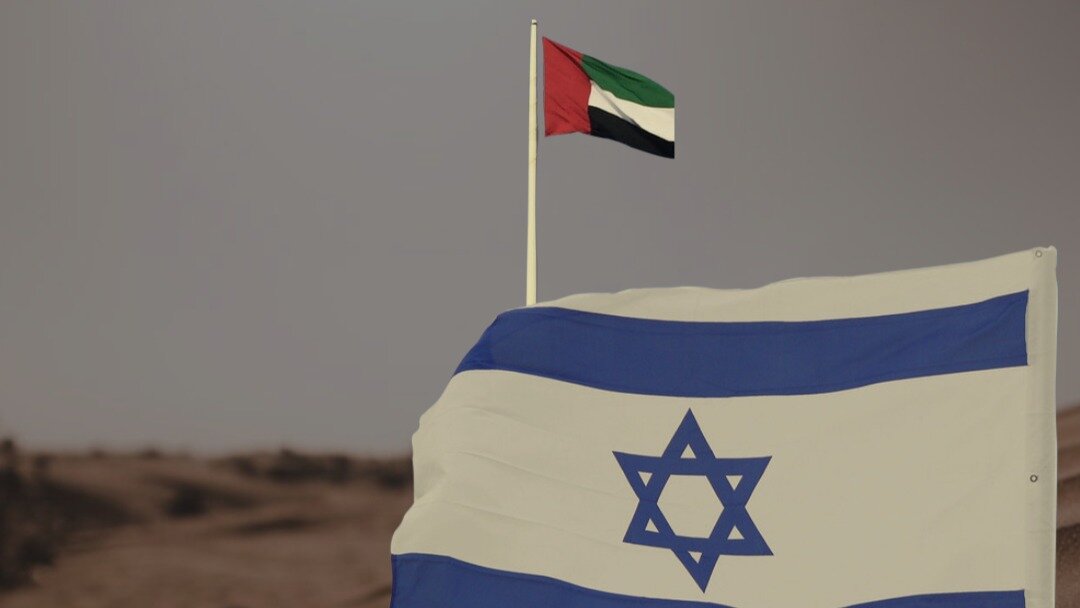Israel and United Arab Emirates Establish Relations
The United Arab Emirates, formerly a participant in and advocate of the Arab boycott of Israel, has established relations with Israel after a two-year period characterized by high-profile Israeli visits to Abu Dhabi. The modern Arab state declared its independence from the United Kingdom in 1971 and no official relationship was formed between the UAE and Israel. Notwithstanding a notable period of hostility between the UAE and Israel following a Mossad-orchestrated assassination of high-profile Hamas commander Mahmoud al-Mabhouh at a hotel in Dubai, the countries have continued to collaborate on security issues, united geopolitically, by their opposition to the Iranian regime.
The historically maintained position of hostility towards the Israeli state, shared by Gulf Cooperation Council members in favor of Palestinian rights and sovereignty, has recently wavered during an Israeli charm offensive on the Gulf nations. Public signs of warming ties have included: Israel’s invitation and gold medal win at the 2018 International Judo Federation’s Grand Slam in Abu Dhabi; Israel’s forthcoming appearance at the Dubai 2021 Expo and several tweets and interviews by the UAE’s Minister of Foreign Affairs Anwar Gargash, in which he indicated that normalization with Israel would also benefit the Palestinian cause.
A notable shift towards more positive coverage of Israeli affairs has been recognized in Emirati media outlets in recent times. While public opinion regarding Israel has not been effectively gaged in the UAE, the official UAE narrative maintains that normalization helps the Palestinian cause. Amidst the Coronavirus crisis, the UAE sent two jets in May and June 2020 carrying aid for the Palestinians, which landed in Tel Aviv. Both cargo flights were rejected by the Palestinian Authority, who claimed that they were unaware of the gesture and that the UAE was prioritizing the relationship with Israel.
An official statement from the UAE declared that the state agreed to establish diplomatic ties with Israel on the condition that Israel commits to halt plans of annexing Palestinian territory, an act proposed by PM Netanyahu during his election campaign in September 2019. However, during a press conference following the announcement of the deal, Netanyahu reaffirmed that “annexation will only be done in coordination with the U.S.” and that Israel will temporarily suspend annexation until after the peace process with the UAE is completed. President of the United States Donald J. Trump was lauded by both parties for facilitating the meetings and while the deal is presented as an accomplishment by both parties, local leaders in Israel are furious with PM Netanyahu for flip-flopping on the annexation issue.
The media sector in the Emirates is extensive, hosting several government-owned TV stations and the headquarters of the biggest regional network, Saudi pan-Arab network MBC. April 2020 saw the release of a Ramadan series titled Umm Haroun, which followed a Jewish family in Kuwait. The show’s premise of showcasing Jewish life in the Gulf was unprecedented, and the debut episode featured a monologue in Hebrew. Following these developments, the Palestinian Authority has been critical of the warming of ties and has repeatedly stated that such a move would be against the interest of the Palestinian nation. Upon the announcement, President of the Palestinian National Authority Mahmoud Abbas asserted that the deal is a “betrayal of Jerusalem, Al-Aqsa, and the Palestinian cause.” Joining President Abbas’ criticism of the deal was Israel’s sworn enemy Iran and Turkey, a state known for its conflictual relationship with Israel in recent years, particularly since a diplomatic incident in 2010 when Israel raided a Turkish flotilla headed for Gaza, resulting in the death of nine Turkish citizens.
In conjunction with the UAE, Bahrain and potentially Oman are expected to make use of this momentum to alter their foreign policy towards Israel. Both countries have shown a change in their media coverage of Israeli affairs in recent times, in particular regarding Prime Minister Binyamin Netanyahu’s visit to Oman in 2018. Despite this, concerns about disappearing hopes for Palestinian sovereignty continue to be of high priority in the international arena, as some criticize normalization before the establishment of an independent Palestinian state. There is now wide speculation that the agreement will lead to renewed direct negotiations between Israel and Palestine will also resume, perhaps mediated by the UAE.
Touting official ambassador posts, direct flights between Tel Aviv and Abu Dhabi, and collaboration in Coronavirus research, this historic agreement between Israel and the UAE brings with it a new opportunity for the Gulf states to influence Israel’s political direction and aid the establishment of a Palestinian sovereign state. Such negotiations would undoubtedly look different and may no longer seek a two-state solution, but one thing must be acknowledged, the UAE has taken a surprising diplomatic step to shake up a long-but-stale peace process.

